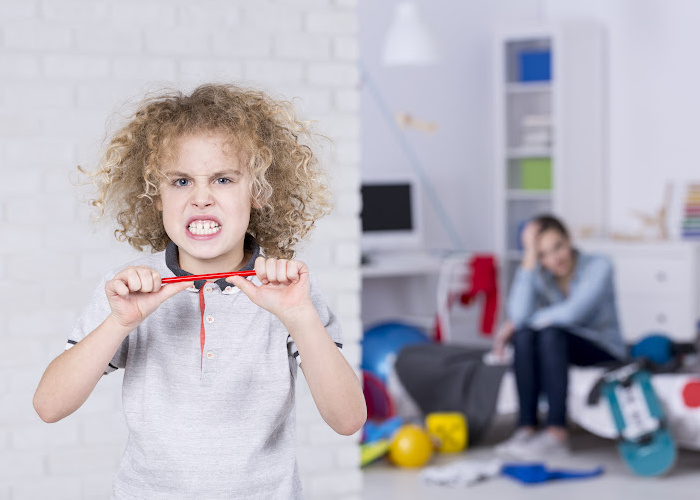It's crucial to know that students with autism and ADHD need special study strategies. Autism…

How to Deal with a Rude Autistic Child
If you’re a parent of an autistic child, you may encounter challenging moments when your child exhibits rude behaviour. It’s important to know that dealing with rude behaviour in autistic children requires your patience and understanding.
In this article, we will provide you with practical strategies to manage and address rude behaviour in your autistic child. By employing these strategies and techniques, you can create a supportive environment that helps your child develop appropriate social skills.
Rude behaviour is not uncommon in autistic children, and can be triggered by a variety of factors. It’s essential to approach the situation with a calm demeanour and seek to understand the reasons behind the behaviour.
This way, you can provide appropriate support and guidance. In the following paragraphs, we will discuss common triggers and strategies for addressing rudeness in autistic children.
Understanding Rude Behaviour in Autistic Children
Dealing with rude behaviour in autistic children can be a challenging task. Before addressing rudeness in autistic children, it is important to understand the reasons behind it. By gaining insight into the perspective of autistic children, you can better respond to their needs and manage their behaviour effectively.
There are various strategies for managing rude behaviour in autistic children. Some of these include:
Identifying triggers: Identifying and understanding the triggers for rude behaviour is important. It may be due to sensory processing difficulties, anxiety, or a lack of communication skills.
Communicating effectively: Communication is key in managing rude behaviour. Using clear and concise language and giving the child time to process information can help in preventing misunderstandings.
Using visual aids: Visual aids such as social stories and schedules can help autistic children understand social situations and expectations.
Addressing rudeness in autistic children involves more than just discipline. It requires a supportive and understanding environment and a willingness to learn their needs and perspectives.
By employing these strategies for managing rude behaviour in autistic children, you can create a positive and respectful relationship with your child.

Teaching Manners and Social Skills
If your autistic child displays rude behaviour, teaching them manners and promoting social skills can help them interact with others respectfully. Clear communication, role-playing, and positive reinforcement are effective techniques to consider.
Clear Communication: Autistic children may find it difficult to understand social cues and expectations. To help them, communicate clearly and directly, using simple language, and specific instructions. Be patient, and give them time to process the information.
Role-playing: Practice social situations with your child through role-playing. For example, you can act out situations where your child needs to ask for help or wants to initiate a conversation with someone. This helps them develop social skills in a safe environment.
Positive Reinforcement: Rewarding positive behaviours is an effective way to motivate children to practice good manners. Reinforce the behaviours you want to see more of, such as saying “please” and “thank you” or sharing toys with others. Rewards can be verbal praise, stickers, or small treats.
By teaching manners and social skills, you can help your child interact with others effectively and reduce the likelihood of rude behaviour.
Creating a Structured Routine
Effective discipline for rude behaviour in autistic children involves creating a structured routine that supports emotional regulation. Establishing routines and sticking to them can help the child feel in control and reduce anxiety. Consistency is key, and following a predictable schedule can help minimise the occurrences of rude behaviour.
When creating a routine, it is crucial to consider the child’s needs and preferences. Begin by establishing a consistent sleep schedule, as proper sleep can help regulate behaviour. Set specific times for meals, playtime, and learning activities, and stick to them as much as possible.
If you need to introduce a change in the routine, do so gradually and communicate the change clearly to the child. Visual aids, such as a visual schedule or a timer, can be helpful in illustrating the changes to the routine and preparing the child for them.
Additionally, creating a calm and organized environment can support emotional regulation in autistic children. Minimize unnecessary noise and clutter, and provide a designated space for the child’s belongings and activities. This can help the child feel in control of their environment and reduce stress levels.

Using Positive Reinforcement and Rewards
Effective discipline for rude behaviour in autistic children involves positive reinforcement, which means acknowledging and rewarding good behaviour. By focusing on positive feedback, you can motivate the child to practice good manners and develop appropriate social skills. Here are some techniques that you can use:
Verbal Praise: When your child practices good manners or shows improvement in their behaviour, praise them. Use positive and encouraging words like “Well done” or “Great job”. This will help them feel good about themselves and reinforce the positive behaviour.
Token Economy: A token economy is a reward system where the child earns tokens or points for good behaviour. These tokens can be redeemed for a prize or reward. For example, you can give the child a token every time they say “please” or “thank you” and allow them to exchange the tokens for a small toy or activity they enjoy.
Structured Rewards: Offer structured rewards based on your child’s interests. For example, if they enjoy playing with Legos, offer them a few extra minutes of Lego time if they use good manners during a meal.
Make it Meaningful: Rewards don’t have to be expensive or time-consuming. A simple way to encourage good behaviour is to make a chart or graph to track progress. Chart progress in a visible place and celebrate major milestones with a special activity or outing.
Remember, it is important to be consistent with rewards. Don’t forget to praise good behaviour and offer rewards for positive changes in behaviour. This will help reinforce the desired behaviour and build the child’s self-esteem.
Seeking Professional Support
If you find dealing with your child’s rude behaviour overwhelming, seeking professional support can be incredibly helpful. Consulting with a therapist or joining a support group can provide you with practical advice and emotional support, helping you to navigate this challenging situation.
Professional support can also help you to identify which parenting techniques are most effective for your child’s specific needs. By getting a professional assessment of your child’s behaviour, you can gain a better understanding of what may be causing their rudeness and how to respond to it.
It is important to remember that seeking professional support is not a sign of weakness, but rather a proactive step towards helping your child thrive. Building a supportive network of professionals, friends, and family can help you to develop effective parenting techniques and improve your child’s overall well-being.
Conclusion
Dealing with rude behaviour in autistic children can be challenging, but with patience, understanding, and effective strategies, you can create an environment that supports your child’s emotional regulation and social development.
By teaching manners, creating a structured routine, using positive reinforcement, and seeking professional support, you can help your child navigate their emotions and develop appropriate social skills.
Remember, every child is unique, so it may take time and experimentation to find what works best for your child. With dedication and support, you can help your child thrive and build the foundations for a fulfilling life.
Frequently Asked Questions
How can I deal with rude behaviour in my autistic child?
Dealing with rude behaviour in autistic children requires understanding and patience. Some strategies you can try include teaching manners and social skills, creating a structured routine, using positive reinforcement, and seeking professional support.
Why do autistic children sometimes exhibit rude behaviour?
Autistic children may exhibit rude behaviour due to various triggers. It is important to understand their perspective and the reasons behind their behaviour before addressing it.
How can I teach manners and social skills to my autistic child?
Teaching manners and social skills to autistic children can involve techniques such as clear communication, role-playing, and positive reinforcement. By focusing on these methods, you can help them learn appropriate behaviours and interact respectfully with others.
How can a structured routine help in managing rude behaviour in autistic children?
Implementing a structured routine can provide autistic children with a sense of predictability and reduce anxiety. This section will explore strategies for setting up a routine that supports emotional regulation and helps minimize rude behaviour.
How can positive reinforcement and rewards be used to manage rude behaviour?
Positive reinforcement plays a crucial role in managing rude behaviour in autistic children. By acknowledging and rewarding positive behaviours, you can motivate your child to practice good manners and appropriate social skills.
When should I seek professional support for dealing with rude behaviour in my autistic child?
Seeking professional support, such as consulting with therapists or joining support groups, can be beneficial when dealing with rude behaviour in autistic children. They can provide additional strategies and guidance to help manage your child’s behaviour.



This Post Has 0 Comments